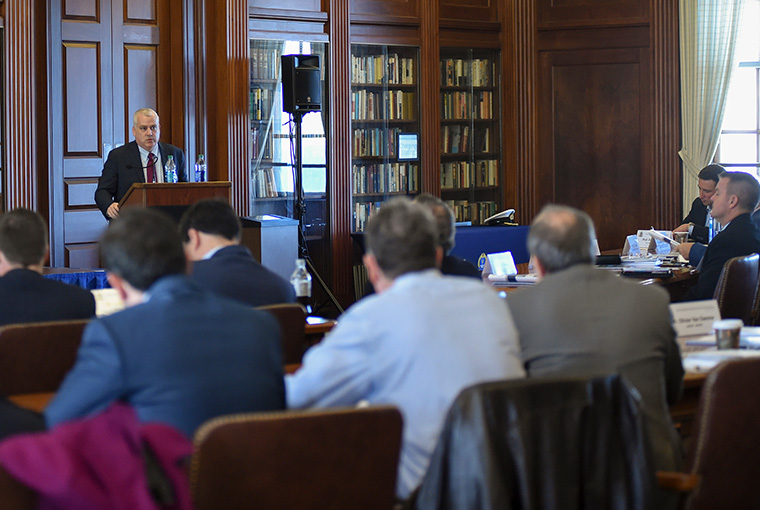Naval War College Supports New United Nations’ Guide on Best Practices for Civil-Military Coordination in Disasters

NEWPORT, R.I. - For the past two years, U.S. Naval War College (NWC) experts, along with experts from around the world, advised and contributed on the United Nations' recently released best-practices guidelines for civil-military coordination in conflicts and disasters.
The U.N. Office for the Coordination of Humanitarian Affairs' Civil-Military Coordination Service published the guide titled “Recommended Practices for Effective Humanitarian Civil-Military Coordination of Foreign Military Assets (FMA) in Natural and Man-Made Disasters” on September 20. The handbook is designed to serve the international humanitarian and military-response communities.
"This document provides an invaluable learning opportunity that builds knowledge and appreciation between humanitarian actors, militaries and other partners," said Michael Marx, senior civil-military coordination adviser for the U.N. Office for the Coordination of Humanitarian Affairs.
"These recommended practices enable us to share what we know as a professional community about humanitarian decision-making and response mechanisms during humanitarian assistance and disaster response operations. Their publication will help us improve cooperation, efficiency and stimulate more refined disaster response planning."
NWC professor David Polatty understands the challenges when international militaries, humanitarian groups and governments try to work together under disaster conditions. He focuses on opportunities like these to improve the tools and guidance used to teach the next generation of civilian and military responders.
"Over the past two years, we worked with an extraordinary group of professionals with expertise on all of the different missions required to coordinate life-saving responses," said Polatty, director of the Humanitarian Response Program at NWC.
"With an acute lack of time, information and, in particular, resources, the coordination challenges with the humanitarian and military response are significant and, if those challenges are not resolved, they ultimately reduce the overall effectiveness of the response."
These diverse challenges led Marx and others U.N. officials to bring together leading practitioners and academics from multiple militaries, humanitarian organizations and agencies to help address the issues that arise when militaries and civilians attempt to respond to emergencies together.
Along with NWC faculty, the drafting process included representation from multiple leading nongovernmental organizations, government departments and ministries, international organizations and academic institutions, including Harvard University.
"It's exceedingly rare to get such dedicated voluntary commitment from these types of experts," said Marx. "But it's a requirement for developing a hands-on tool that will facilitate principled humanitarian action."
Polatty explained the rationale behind NWC's commitment to bring a military perspective to the project.
"It's critically important that international militaries have a better understanding of how their activities can impact the neutrality and independence of humanitarian organizations and that we show how they can unintentionally have an adverse effect on the overall crisis relief effort that aims to save lives and alleviate suffering."
Marx sees this work as part of a broader move to improve the practical realities of humanitarian action on the ground.
"The goal is to meet the real coordination challenges faced by civilian and military responders who are acutely aware there's no single prescriptive answer or playbook to address each emergency they will face. That makes this very difficult work, and an important achievement for our field," he said.
The Recommended Practices for Effective Humanitarian Civil-Military Coordination of Foreign Military Assets (FMA) in Natural and Man-Made Disasters can be downloaded here:
https://sites.google.com/dialoguing.org/home/resource-centre/resource-library?authuser=0
or on the NWC's HA/DR e-Portal at: https://usnwc.libguides.com/hadr
